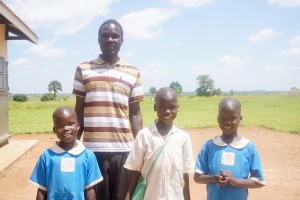News from our Jumpstart! Programme: ECD Centres are mapping their future!
September 18, 2015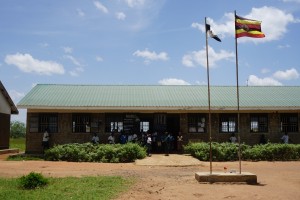 Our Education Jumpstart! team is currently busy conducting Centre Development
Our Education Jumpstart! team is currently busy conducting Centre Development
Plan workshops, in which CMC (Centre Management Committee) members, PTA
(Parents-Teacher-Association) members, SMC (School Management Committees) members and caregivers are trained in developing a Centre Development Plan (CDP) for
their ECD centre. Last week, a two-days workshop was held at St Kizito Bidati Nursery School. With all parties attending, there were 10 enthusiastic and willing ‘learners’, eager to develop a 3-year-plan with one main goal: Quality Education!
The workshop followed three clearly defined objectives:
- Understand planning in the context of Centre Development Plan
- Identify areas that can be considered in that plan
- Understand the steps involved in the development plan
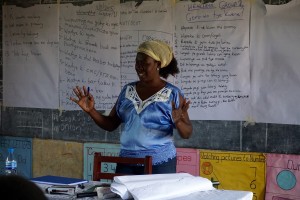 The key word for these workshops is empowerment: We help and guide them through the process of developing their Centre Management Plan by giving them incentives, asking questions and providing some constructive assistance when needed – but it is our participants that come up with concrete ideas which will then translate into their own, individual, customised Centre Development Plan! Right from the start, it is especially important to our Education Programme Coordinator Richard for everyone to realise how quality education can be achieved:
The key word for these workshops is empowerment: We help and guide them through the process of developing their Centre Management Plan by giving them incentives, asking questions and providing some constructive assistance when needed – but it is our participants that come up with concrete ideas which will then translate into their own, individual, customised Centre Development Plan! Right from the start, it is especially important to our Education Programme Coordinator Richard for everyone to realise how quality education can be achieved:
“A lot of school development plans focus on improving infrastructure. However, that doesn’t always have to translate into quality education! Teachers, for example, are much more essential – whatever you invest in their training and development will provide quality education!”
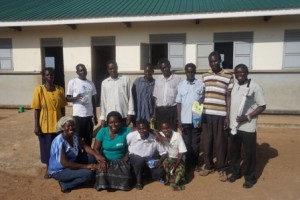 The participants at St Kizito Bidati quickly understood that quality education can only be achieved through a multifaceted approach. This is why, on DAY I, they identified four key areas which their CDP shall focus on: First of all, special emphasis shall be put on (1) ‘Curriculum delivery’ – This means it’s all about the teachers, their training, refresher workshops and adequate materials, but also their motivation from the parents. Here, Julius, a CMC member, stresses
The participants at St Kizito Bidati quickly understood that quality education can only be achieved through a multifaceted approach. This is why, on DAY I, they identified four key areas which their CDP shall focus on: First of all, special emphasis shall be put on (1) ‘Curriculum delivery’ – This means it’s all about the teachers, their training, refresher workshops and adequate materials, but also their motivation from the parents. Here, Julius, a CMC member, stresses
“If you motivate the teachers, they will love your children more. If you care about this, about the teachers, they will have a set mind, they will care about a only your children, not worry about anything else.”
 The second key area is (2) ‘Child-friendly learning environment’. The main focus will be ‘Creating a talking classroom’. This will involve investing in resources, so that at the end of the day, the classrooms are talking for themselves. However, an eye shall also be put on improving outside playing materials and providing enough shade for the children to play outside. Additionally, ensuring a clean and safe environment as well as a clean water source are also part and parcel of this key area. Thirdly, ‘school infrastructure’ (3) shall be improved through, for example, the construction of a bathing facility. Last but not least, boosting (4) ‘parental involvement’ is the fourth key area identified. They are aiming at sensitising parents on the value of ECD through events such as Parents Open Days. Additionally, they came up with another great idea to raise awareness about the importance of ECD: In Uganda, elections are coming up next May and local leaders have already been busy campaigning; the people from Bidati will try to convince some of these local leaders to include ECD in their manifestos! Parental involvement is a key issue for a sustainable change at every school, and at St Kitizito Bidati. This was also evident when looking at development partners and stakeholders. In this respect, as much as the support by NGOs is extremely valuable in these communities, it is decisive to look at them as an additional source of funding that can contribute to areas where parents lack sufficient funding.
The second key area is (2) ‘Child-friendly learning environment’. The main focus will be ‘Creating a talking classroom’. This will involve investing in resources, so that at the end of the day, the classrooms are talking for themselves. However, an eye shall also be put on improving outside playing materials and providing enough shade for the children to play outside. Additionally, ensuring a clean and safe environment as well as a clean water source are also part and parcel of this key area. Thirdly, ‘school infrastructure’ (3) shall be improved through, for example, the construction of a bathing facility. Last but not least, boosting (4) ‘parental involvement’ is the fourth key area identified. They are aiming at sensitising parents on the value of ECD through events such as Parents Open Days. Additionally, they came up with another great idea to raise awareness about the importance of ECD: In Uganda, elections are coming up next May and local leaders have already been busy campaigning; the people from Bidati will try to convince some of these local leaders to include ECD in their manifestos! Parental involvement is a key issue for a sustainable change at every school, and at St Kitizito Bidati. This was also evident when looking at development partners and stakeholders. In this respect, as much as the support by NGOs is extremely valuable in these communities, it is decisive to look at them as an additional source of funding that can contribute to areas where parents lack sufficient funding.
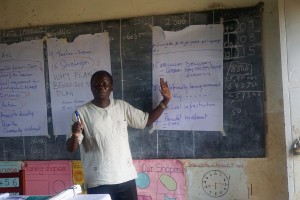 On DAY II, they were ready to get into the details and started off with a SWOT/SCOT (Strengths, Weaknesses/Challenges, Opportunities, Threats) analysis of their school. This is done for specific purpose:
On DAY II, they were ready to get into the details and started off with a SWOT/SCOT (Strengths, Weaknesses/Challenges, Opportunities, Threats) analysis of their school. This is done for specific purpose:
“We want them to see everything in order to make them aware of what is going on how they can use their opportunities to erase their weakness & strengths.”(Richard)
As the ECD centre is only in its nascent stage, it is faced with several challenges andweaknesses, ranging from a lack of classroom, bathing facilities, shades and playing and learning material to high rates of absenteeism in rainy and harvest seasons and rather low 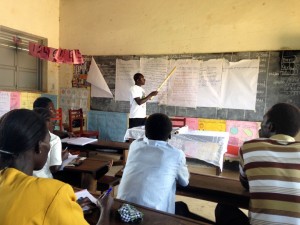 parental involvement. And poverty continues to plague the communities in the region, ultimately representing a threat to the mere maintenance of the nursery. However, they hope to tackle these issues by drawing on their strengths, such as dedicated and qualified teachers, committed CMC members, good enrolment and valuable support of the primary section, and exploiting their ‘opportunities’, may it be through cultivating bare school land for meals for the children or bringing more parents as well as children on board through greater community sensitisation.
parental involvement. And poverty continues to plague the communities in the region, ultimately representing a threat to the mere maintenance of the nursery. However, they hope to tackle these issues by drawing on their strengths, such as dedicated and qualified teachers, committed CMC members, good enrolment and valuable support of the primary section, and exploiting their ‘opportunities’, may it be through cultivating bare school land for meals for the children or bringing more parents as well as children on board through greater community sensitisation.
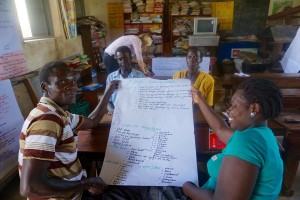 Before everyone was off for the weekend, they started to get to the details, having a look at what resources and expenses will be necessary in order to implement their CDP. Participants were split up into groups. Coincidentally, their results perfectly complemented each other: While the first focused much more on the construction aspect of the SDP, the second prioritised on resources needed inside the classrooms. And once again, they agree on the importance of investing in teacher training. Additionally, their realistic mind-set and awareness of their limited resources inspires them to think practically. For example, when it comes to their constructions plans, they also consider local grass-thatched houses as an alternative.
Before everyone was off for the weekend, they started to get to the details, having a look at what resources and expenses will be necessary in order to implement their CDP. Participants were split up into groups. Coincidentally, their results perfectly complemented each other: While the first focused much more on the construction aspect of the SDP, the second prioritised on resources needed inside the classrooms. And once again, they agree on the importance of investing in teacher training. Additionally, their realistic mind-set and awareness of their limited resources inspires them to think practically. For example, when it comes to their constructions plans, they also consider local grass-thatched houses as an alternative.
The common goal of everyone involved inspires great teamwork and contribution – when Denis, one of the caregivers, addresses the issue of the provision of midday meal by parents, he makes quite a bold move, saying:
“Sometimes you give your children a meal, but you forget about the teachers.”
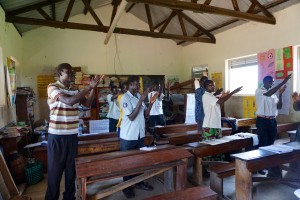 – But the cheekiness is met with great generosity by the attending parents, as they offer to supply the teachers with some land as well as support in the preparation of the land. Filled with motivating appreciation claps for their work, the two-days workshop at St Kizito Bidati ECD centre passed quickly and they look forward to the next workshop, eager to set their CMP into stone.
– But the cheekiness is met with great generosity by the attending parents, as they offer to supply the teachers with some land as well as support in the preparation of the land. Filled with motivating appreciation claps for their work, the two-days workshop at St Kizito Bidati ECD centre passed quickly and they look forward to the next workshop, eager to set their CMP into stone.
From the perspectives of the ‘Juliuses’
Following the workshop, we had the opportunity to talk to a PTA and CMC member who are both called Julius. Find out more about them in the following paragraphs!
Julius #1 – PTA member
We had the opportunity to chat to Julius, a farmer and PTA member at St Kizito Bidati. Four of his five children have already left primary school, but Moses, his youngest, remains and additionally, two of his grandsons, Patience and Emmanuel, from his oldest son, Walter, are currently in K3. Last year, Julius was selected as a PTA member by the community – a position that he has appreciated so far:
“I like it, because I am part of the school, it makes me part of the school. I know how learning is taken place; and above all, my child are also here.”
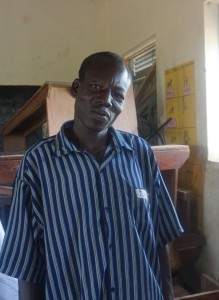 Here is an extract of our feedback-chat:
Here is an extract of our feedback-chat:
What do you think about the performance of the school ?
The school is doing well, but there are certain things that need to be improved on – mostly the parents, who are not doing their part. What do you think of ECD? I am very positive about the ECD, because that is the foundation, for this school to succeed, although there are still challenges with them; there are a few things to be done with the ECD to have that quality.
What do you think of the Jumpstart! project?
For me, the Jumpstart! project is really good, it’s coming to complement what parents are trying to do.
What is best about it?
What I like most about this is the caregivers training, and refresher coursers, the way that teachers are being developed in their skills and are improving each time, because the teachers have demonstrated what they were like before and what they are now. And we, as the management, we were very happy about that. And I think, the impact will go to the children.
What do you think of the workshop?
This workshop is very good. And it wasn’t there before. No one was thinking about it. I now understand the planning – it gives people the opportunity to know what they are supposed to be doing. And I was interested to know more of the different roles of the stakeholders. And I was requesting that such support, if possible, should continue to the leadership of the school, to the management, because it would help them do their work well.
What’s the most important part for you to implement in the CDP?
For me, curriculum delivery is the most important, as well as supporting the teachers, their training and providing the learning materials.
What do you hope for the school?
My hope for this school is to have more caregivers; at least two per class, and this will improve the quality of teaching.
Julius #2 – CMC member
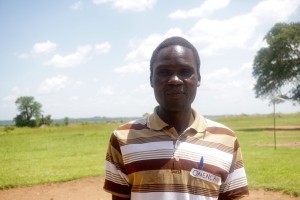 Meet Julius, a 36 year-old farmer from Bidati village in Nyowa district, father of Jacob, Prosie and Fiona, and dedicated member of St.Kitizo Bidati School Central Management Committee ! He was one of the attendees at the two-day Jumpstart! training workshop about developing a Centre Development Plan.
Meet Julius, a 36 year-old farmer from Bidati village in Nyowa district, father of Jacob, Prosie and Fiona, and dedicated member of St.Kitizo Bidati School Central Management Committee ! He was one of the attendees at the two-day Jumpstart! training workshop about developing a Centre Development Plan.
The most important thing that Julius learnt at the training is the importance of planning:
“before the training, the committee was motivated, but not so organised because there was no plan. Now we know who should do what at which time because in the plan everything is detailed – timeframe, goals, responsables, activities. And we are not stopping here – we will meet with other parents to communicate this knowledge.”
Learning how to create action plans has formalised the way the committee works, making them more efficient and productive. Julius is positive that with these new skills, the committee can encourage parents to unite to support the progress of the school.
In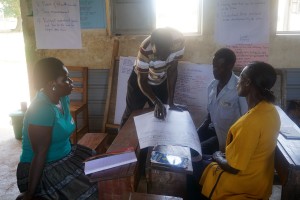 deed, Julius wants to form a committee plan that will raise the standard of education at nursery level, ultimately increasing the quality of teaching and learning and contributing to early childhood development. His belief in the importance of nursery education is based on his own experience as a parent. While his two daughters attended nursery school, his son Jacob did not. The two girls excel at school (Fiona is 1st in her class), often receiving certificates praising their academic performance and organisational skills. However Jacob struggles at school, and has little interest in completing his homework. Julius attributes the educational success of his daughters to their nursery education, which he says helped them to build basic skills and confidence before entering primary level.
deed, Julius wants to form a committee plan that will raise the standard of education at nursery level, ultimately increasing the quality of teaching and learning and contributing to early childhood development. His belief in the importance of nursery education is based on his own experience as a parent. While his two daughters attended nursery school, his son Jacob did not. The two girls excel at school (Fiona is 1st in her class), often receiving certificates praising their academic performance and organisational skills. However Jacob struggles at school, and has little interest in completing his homework. Julius attributes the educational success of his daughters to their nursery education, which he says helped them to build basic skills and confidence before entering primary level.
However, we think that Julius’s dedication to his children’s education has also contributed to this success. He keeps a close eye on his children’s progress both at school and at home, attending ‘lesson day’ each term, a time for parents to attend classes with their children, observe the work scheme and discuss the curriculem with the teachers. Julius regrets leaving school at a young age, so he really values lesson day;
‘I always want to attend, rather than my wife, and sometimes I ask to be set assignments with the children !”
Now that’s dedication ! In the future, he hopes that his children will study hard, but above all “be self-respecting individuals, with careers of their own, who value their jobs”. And he will also do his best to improve the quality of nursery education at Kizito Bidati so that all the students can grow as individuals and have successful careers.
